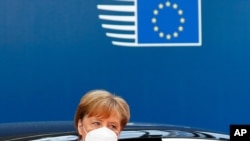European Union leaders resumed negotiations in Brussels Monday following a midday break on their fourth day of talks aimed at agreeing on a $2 trillion budget and funding to help member states cope with the effects of the coronavirus pandemic.
The negotiations were originally meant to run only through Saturday.
German Chancellor Angela Merkel said that negotiators late Sunday had agreed to a framework for a possible agreement, which she said is a step forward and gives hope that an agreement may yet be reached Monday, or, at least, that an agreement of any kind can be reached.
Merkel said the negotiations had been “incredibly tough” but she said, “exceptional situations require exceptional efforts.”
EU Commission President Ursula Von Der Leyen called this round of negotiations a “crucial phase,” but echoed Merkel’s cautious optimism, saying she had “the impression that European leaders really want an agreement.”
The past few days have been defined by a divide that has pitted five wealthy northern European countries – Austria, Denmark, Finland, the Netherlands and Sweden – against southern nations that have been hit hardest by the coronavirus and which have the support of Germany and France.
The northern countries have advocated instituting strict spending controls as part of any deal, while others such as Italy and Spain have sought to minimize such conditions.
EU nations have experienced 135,000 deaths from COVID-19, with Italy, France and Spain having among the highest death tolls in the world.
The lockdown orders instituted by many governments to stop the spread of the virus have hurt the EU economy, with economists forecasting an 8.3% contraction this year.





